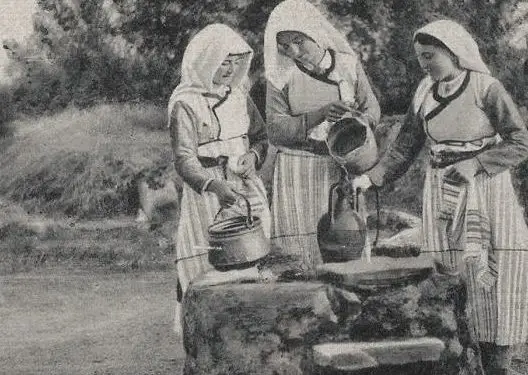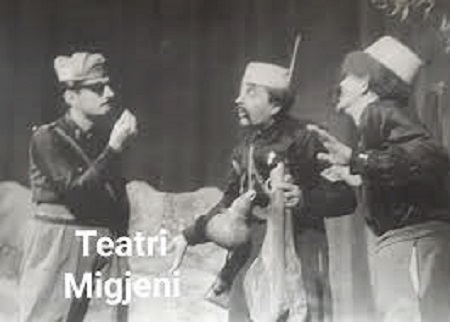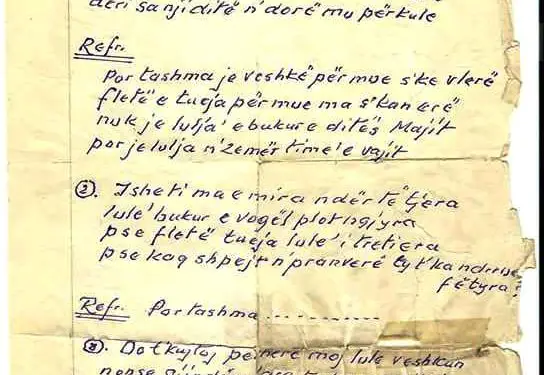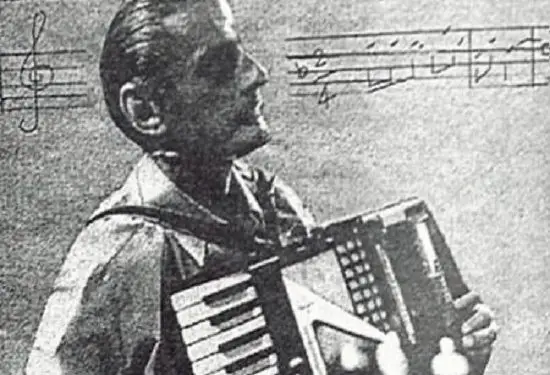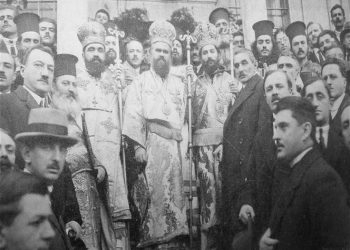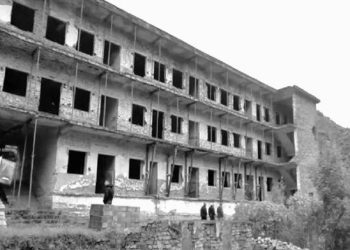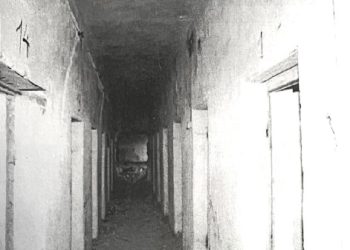By Kabil Bushati
– “After the 90s, Ermira Babaliu sings Pjerin Ashiku’s song and presents it as a serenade song, changing the musical line and the text…! –
Memorie.al / In the dance evenings we organized when we were in high school, in the halo of tangos performed by the orchestra, “May flower” was without question. We melted under the sounds of this sweet music, when you listen to it, we can say without hesitation that it; it melts the world’s coldest heart and makes it experience warm waves. This magical song became the anthem of dance nights and concerts of that time. The song took the stage and took the hearts of the people of Shkodran. But where was this tombstone song born?! He was born in the land of love, there in Shkodra Square. It was composed by Pjerin Ashiku, who lived in Pjaca and went out at night to the currency shop, experiencing the mystical world of sounds and melodies. In this square, thousands of songs were born, by different composers from Shkodra. As always by his side, there were two brilliant Shkodran comedy actors, Tano Banushi and Bik Pepa. They even threatened Tano often, that they would expel him from the party, because he sat in the afternoons with Pjerin Ashiku, who took out barcoletes against the Party, as the only way to counter the injustice that the dictatorship did to him.
But who was this man who released this pearl song, which has stood the test of time for half a century and is becoming more loved and sought after every day? Has he composed other songs or is he satisfied with one? Where did you come from and what conservatory did you attend, Rome or Vienna, Paris or Berlin?
Pjerin Ashiku was born in the city of Shkodra on October 10, 1926 in an old family with Shkodra traditions. The family of Pashko Ashiku (Pjerini’s father) was part of those families that cultivated culture in Shkodër. For four generations, this family has maintained a modern pharmacy in the middle of Shkodra, serving fellow citizens with medicines since the 18th century. Thanks to this ephemeral dynasty, Shkodra used medicines produced in Italy, Germany, Austria and France, when Tirana still boiled mullein and nettle leaves for stomach and liver diseases. Pjerini’s father was a pharmacist doctor, graduated in Rome in 1903.
While the mother, Teresa, was of Russian origin, born in the capital of Russia; Petersburg. Mother Teresa was the sister of the Russian consul accredited in Shkodër. We are not exaggerating if we say that this dynasty was of a cultural rank with European families. Therefore, the parents were interested in the education of children mainly with European culture.
From an early age, before he turned 7, his parents noticed that Pjerini’s tastes were inclined towards music and singing. This also caught the eye of Ndreka Kaçulini, who had the main hardware store in Pjaca. It didn’t take long for Ndreka, being a musician himself, to give little Pjerini a guitar and an accordion, the first to come to Shkodra.
And where was Pjerini now, making music, with friends older than himself. Since his teenage years, he has been active with Ndrek Kaçulin, in the musical orchestra. Seeing that he was talented in music, his parents let him take violin lessons at Father Martin Gjoni. He finished high school near the Saverian College, where he stood out as a born and very promising talent in the fields of music, singing and acting. Pjerini was a talented instrumentalist in the guitar, accordion, instruments which, throughout his life, would accompany him in his musical creativity.
The liberation of Albania, from the Italian-German occupation, found Pjerin, a newly graduated high school student. He is active in the melodramas ‘Judas Maccabe’, ‘Basifondi’. He was a friend of the great composer Prekë Jakovë, Zef Zorba and later of the bass player Lukë Kaçaj and the composer Zef Lekaj. The time comes for him to perform his mandatory military service, but even there, fate smiles at him and he passes by the Army Choir in Tirana. They want to keep him there forever, but who remembers his “bourgeois” origin and they send him away. He returns to Shkodër.
Due to economic needs, he stops all musical activities and looks for a job. They assign him a worker in the Food Enterprise. After a while, he leads the variety group of this company and wins the first prize. In this amateur group, songs that Pjerini had begun to compose were also sung, which, according to the opinion of the time, were noted for their sweetness. With the creation of the Estrada of Shkodra, it is appointed with its orchestra. It stands out for its musical accompaniment, parodies and intermexos. During the time he stayed in Estrada, a quality hop and the promotion of new talents stand out, such as: Zyliha Miloti, Tonin Tërshana, Besnik Çinari, etc., who years later, became popular singers and actors, in all of Albania.
However, it was not said that he would continue for a long time on the stage of the city. They remove him from the stage and appoint him as an adjuster in the Vehicle Park. This was a heavy blow for Pjerin. From the professional Estrada, he was sent to an enterprise, as an adjuster. Instead of the accordion or the guitar, he would pick up the lathe. But even there he does not give up, but creates an amateur pop group, which competed decently in many national meetings and received first prizes.
We add here that the entire libretto and music were created by Pjerin Ashiku. This was the most culminating period of Pjerini, in terms of his musical creativity. Here his talent and his broad culture stood out. He created numerous parodies and composed many unforgettable songs, which are still sung today, mainly based on folk motifs from Shkodra.
Pjerini, thanks to his humor, was known by everyone in Shkodër and beyond, he still worked at the Automotive Park, now even grown up in “responsibility”, as a designer, and at one time, he was a perfect librettist, composer and accordionist, who was the heart of the company’s show, of that time. In this period, prestigious songs were born, such as: “Pavement of my city”, “Cilma the path”, “Sea of love”, “Ermira”, “Little Miri”, “Kukulla”, “Valbona”, etc., etc. Meanwhile, during these years, his talent stood out, even as a painter.
The genuine musical creativity of the composer Pjerin Ashiku, includes 140 songs, and many musical parodies and intermezzos. At the time of the dictatorship, his songs were successfully sung in ‘Decades of May’, such as the songs: “Njja zog i small” and “Ermira”, but what always annoyed Pjerin was the fact that, his name never appeared as a composer. This concealment of his name by the government annoyed him and hurt him.
In this period, it is accepted in the Song Festival on Albanian Radio and Television, but it is worth noting the transformation that the song “Kukullë” undergoes, whose name is changed and titled “Vashat”. Let the title be changed, but radical transformations are made and it is discarded from the first night of the festival.
Later, the song “Kukulla” is sung by the well-known singer, Justina Alija, in the show “100 years of music”, a song she had sung at the Children’s Festival, as early as 1964. The song also underwent an extreme transformation. “Ermira”, which was named “My daughter” and the author, was not mentioned at all. The song “Little Miri” suffers an even bigger scandal, changing its title and becoming “Besmiri i little”, dedicating it to Enver Hoxha’s grandson. Always without asking and mentioning the author, because the dictators also needed songs dedicated to their nephews, where they asked about the authors…!
In the time of democracy, the song “A little bird”, with lyrics by the well-known writer from Shkodran, Fadil Kraja and music by the composer Pjerin Ashiku, is appropriated with the greatest shamelessness, by a Korčar singer, who even manages to call himself also a singer-songwriter, on Albanian Radio-Television, in 1999. As we said at the beginning of the article, Pjerin Ashiku is the author and composer of the brilliant song “Lules se Majit”, one of the pearls of Shkodra and Albanian music.
You will be surprised by the fact that, even for this song, other places, such as: Korça, Ulqini and Kosova, have become a creative land. Because after all, everywhere there are lovers and those worried about love. Everywhere there is a “May Flower” and for every person, there would be a song or a serenade. But there are no composers like Pjerin Ashiku everywhere; they are not born anywhere else but in Shkodër. In the years of democracy, Ermira Babaliu sings this song and presents it as nothing wrong, as a serenade song, changing the musical line and irresponsibly changing the text! For this, Pjerini addressed a letter to the director of RTS, but he never received an answer.
The state was opposing him with silence, letting others do whatever they wanted with his songs. The story of the appropriation of this song continues to this day. If you ask the people of Korče, they will say: “Good morning, ‘Lulka e maji’ is a serenade in Korče”, if you ask the Kosovars, they will say: “Hey, you’ve got it, Albanians, that’s a joke gjakovare we sing it from Isa (Ismet Peja)”, and so on. Everyone tries to put their own money on it, everyone wants to “mortgage” it and declare it their own property.
This digital “war” has been going on for years as if it had started yesterday. Don’t forget that this song by Pjerin Ashiku is dated 1954. However, the song has traveled throughout Albania in time and space, becoming an Albanian “Danube Waltz”, if the Hungarians have a famous waltz, such as the “Valsi i “Danubit” and the people of Shkodra have a monumental tango, such as “Lulja e Majit” or “Tango e Buna”. Its sounds, put back and accompany, throughout the Pedestrian Square of the city of Shkodra, like sweet shadows.
“But you are old, you don’t smell anymore
Your flowers are of no value to me,
It is not you, the beautiful flower of the May day
But you are the flower of my oil song…”!
When you hear it, it provokes with the same magic even with the vibrations of the iciest heart that can exist in the world. This flower and wind has traveled almost all over the Albanian lands for more than six decades and it still remains a monumental song. But there came a day when Pjerini got tired of this silent oppression, which was slowly wearing him down and taking away his soul. It was the years of the dictatorship and in dozens of meetings of the Executive Committee, for art, they insulted him to the point of spiritual pain, labeling him as a sentimentalist and pessimist in his music.
In one case, proverbially, the composer responded with grave words, quoting the verses of the song “Miri i majole”, which they had transformed, which said that; “a rifle and a pickaxe are added to the homeland”, here the composer stood up, rebelling, and said ironically: “Or do you want songs only with rifles and machine guns…”?! It seemed to him that he released all the anger that had accumulated in his soul.
Composer Pjerin Ashiku never had any moral satisfaction or economic treatment. All his life he was left in oblivion and with a small salary, enough to keep his breath alive. Although he was a composer, instrumentalist, singer-songwriter, and humorist, who sang all his life, with much love for Shkodra and its people, he was a loving person with a poly-dimensional soul; he was left in virtual exile, in the middle of the city. On September 21, 1995, Pjerin Ashiku closed his eyes forever. The wife, son and daughter immigrated to the USA. Mark Bregu, his friend, dedicated these lines to him in a local newspaper:
“Eyes with tears, they fill with oil,
Weep for Velečik’s Fairies,
When you remember the “Flower of May”,
Kangen perl’ t Pjerin Ashiku,
Musician and humorist,
That Shkodra wished him well,
As a painter and an artist,
Citizen Soul and heart”!
Pjerin Ashiku passed away years ago, taking with him the worries and sorrows that life under the dictatorship caused him. “Velčik’s fairies”, they have been lamenting over murana for years. On his grave there in Rmaj, the cypress flourishes and the dandelions bloom. The wind caressed the leaves, and along with the wind, even today, come those famous sounds of “May Flower”, or if we can call it: “Buna Tango”…! Rest in peace, Pierre…! Memorie.al




